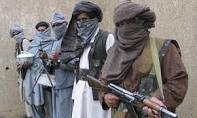In a previous blog post, I wrote about Afghan president Ashraf Ghani's initiatives to woo Pakistan to exert pressure on the Taliban to begin serious negotiations and bring peace to his war torn country. Ghani has placed most if not all of his eggs in one basket in the regional context, for which he has come under fire from some corners of Afghanistan. This is a risky approach as the Pakistanis who support the Taliban and provide safe havens for them have thus far done nothing to pressure the Taliban to act. And in fact Pakistani authorities have moved against certain Taliban who were in favor of negotiations with their brethren in Kabul.
A case in point is Mullah Abdul Ghani Baradar. He was the second in command to Mullah Omar in the Quetta Shura, as the Taliban leadership group is known. Mullah Baradar was one of the founding members of the Taliban in 1994. He was in charge of the day to day operations of the Taliban and as such, was the second most wanted person by the U.S. and Afghan authorities. In February 2010 he inexplicably disappeared from a religious madrassa in Karachi. After an initial silence, Pakistani officials eventually confirmed Baradar's arrest. Although former Afghan president Karzai repeatedly demanded Baradar's release, he remains in Pakistani custody today. The reason for his arrest is widely believed to have been his inclination at the time to begin a dialogue with the Afghan government. When I worked as an International Security and Assistance Force advisor to the Afghan High Peace Council (HPC) in 2012, HPC chairman Sallahudin Rabbani visited Pakistan in hopes of talking to Mullah Baradar and gaining his release. Mr. Rabbani, who is the current Afghan Foreign Minister, did not succeed.
However there are indications of renewed efforts by the Afghan government to secure Baradar's release in exchange for the release of a number of Tahrik-e-Taliban Pakistanis (TTP) who are in Afghan government custody. Although TTP is a Pashtun led Sunni group allied with a number of other terror groups in the mostly Pashtun areas of Pakistan's Northwest Frontier, their aim is to fight the Pakistani government. TTP members take refuge across the border in Afghanistan from time to time where some of them have been arrested. Whether the efforts of the current Afghan government will yield results is unknown. But an even bigger question is whether Mullah Baradar could be instrumental to play a role in bringing the Taliban to the peace table. Firstly he has been languishing in a Pakistani jail for nearly four years, away from the action and his cohorts. Secondly, the fact that Mullah Omar and his fellow Taliban have not been able or did not want to pressure Pakistan to release Baradar raises the question of his standing among them. So he may no longer be able to play a significant role in the peace process. But he could still provide information about the Pakistan - Taliban relationship which could prove detrimental or at least embarrassing to Pakistan. Hence the reason for his continued incarceration in Pakistan.
Against this backdrop, in the last couple of weeks Afghan president Ghani has reportedly sent a letter to the Pakistani government demanding a number of actions be taken relative to the Taliban. As reported by Gran Afghanistan, Ghani has given a timeline of about a month for Pakistan to take concrete steps towards implementation of these measures, so that Pakistan:
- Officially condemns the Taliban's terroristic operations against Afghanistan.
- Closes down the Taliban's safe havens in Pakistan.
- Combats the Haqani group and arrests its leaders responsible for many bombings and other operations in Afghanistan.
- Arrests leaders of the Quetta Shura and well as the Peshawar Shura based on the premise that they pose a threat to a friendly country (Afghanistan).
- Hands over all wounded Taliban personnel to the security authorities for investigation purposes.
- Makes an agreement for the exchange of persons of interest between the two countries, such as Mullah Baradar.
- Bans Pakistani chemical factories from selling material that can be used for making explosives (such as Ammonium Nitrate) to unlawful groups.
- Coordinates between Pakistan and Afghanistan to prevent the easy passage of terrorist groups between the two countries.
Given Pakistan's history of support for the Afghan Taliban, there is little chance that the Pakistani government and especially their military/Inter Services Intelligence will agree to completely shut down the Taliban safe havens. Pakistan has used the Taliban as a strategic and tactical weapon to control Afghanistan and to counter the influence of India in that country. What tune Ashraf Ghani and his coalition partners in the Afghan Government of National Unity will play if Pakistan does not agree to their demands is unknown at this time.


